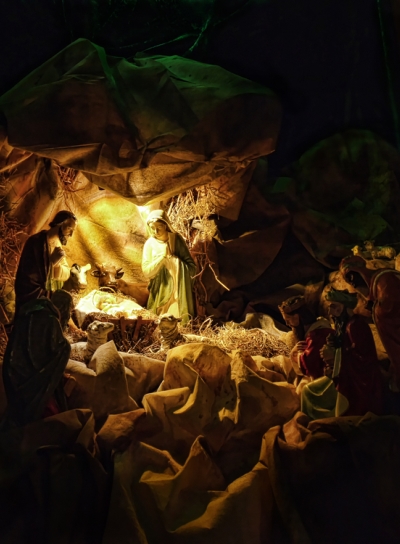Regardless of religion, much of the world worships, believes in, or supposes a terrible deity. This “God” causes or permits death, destruction, disaster, droughts, disorders, disease, and damnation—and these are just the words that alliterate nicely. This “God” hates homosexuals, privileges males over females, has cursed certain races and religions and conditions, and does not tolerate differences.
In this article, I would like to point out 3 crucial problems that arise when one begins with “plain truths” about the book rather than the Christ, the Logos, the “structuring principle of reality.” (John 1:1–5)
(Excerpt from Theology From Exile Vol. III, The Year of Mark by Sea Raven, D.Min.) Acts 10:34-43; Isaiah 25:6-9; Psalm 118:14-24; 1 Corinthians
Loving kindness is the cultivation of benevolence toward all living beings, love without clinging, and a strong wish for the happiness of others. It is the kind of love that often bubbles up freely in the heart of a mother for her child. It is a love that is independent of expecting or needing anything in return.
For those like me who see Jesus, not as the divine Son of God in our midst, but as a courageous sage and social prophet, and for those of us who see God as other than an all-powerful distant deity – the language of reverence is rooted in the story of existence and the universe itself. That becomes a religious story whispering of a larger meaning of our existence or in Bumbaugh’s words each of us is “a self present in the singularity that produced the emergent universe; a self present at the birth of the stars; a self related through time to every living thing on this planet; a self that contains within it the seeds of a future we cannot imagine in our wildest flights of fantasy.” That non-traditional evolutionary sacred story invites us to stand in awe; and it calls us to create a whole new vocabulary of reverence even as we commit to cherishing and caring for the earth.
Hebrew Scripture’s View of Life after Death It wasn’t until after the Babylonian Exile that the Pharisees accepted the idea of heaven and
For Christians grace is God’s gift of pardon. According to William Barclay the Greek word for grace was originally a military term. When an emperor came to the throne or celebrated a birthday, he would give his troops a donatirim (donation), which was a free gift that they had not earned; it was given out of the goodness of the emperor’s heart. This idea was picked up by the Christian scripture writers when they wrote about the grace of God. Grace is something that is unearned and undeserved – unmerited pardon.
Structured for Lent, but practical for any time of the year, this new resource examines the lament psalms for their connections to contemporary experiences. The introduction acquaints the reader with Dr. Walter Brueggemann's analysis of the psalms into the categories of orientation, disorientation, and reorientation. A contemporary psalm/poem for each entry discerns the emotional tenor of the psalms and makes it relevant for the challenges of contemporary life and relationships.
The dry bones raised by Ezekiel are a metaphor for those who died in the service of God’s justice: those who died working to restore God’s distributive justice-compassion to God’s Earth, and who themselves never saw the transformation. The army of dry bones is an army exiled from justice. Fairness demands that if Jesus was resurrected into an Earth transformed into God’s realm of justice-compassion, then all the other martyrs who died too soon should also be raised with him. “But in fact,” Paul writes in 1 Corinthians 15:20, “Christ has been raised from the dead, the first fruits of those who have died.” It is the Christ – the transformed and transfigured post-Easter Jesus – who has started that general resurrection, which restores justice-compassion to a transformed Earth. The transformation has begun with Jesus, and continues with you and me – IF we sign on to the program.
One of the most reliable facts concerning Jesus is that he was crucified during the reign and by the action of the Roman procurator, Pontius Pilate, who served by appointment of the Caesar from 26-36 CE. The Roman senator and historian Tacitus referred to Jesus’ execution by Pilate in his Annals, which was written circa 116 CE. Beyond that, however, there is not much historical evidence.
So what do I mean by a sacred community or spiritual community, or as Peck would call it a true community? I refer here to an intentional community with an identifiable common purpose. Maybe that purpose is simple to grow spiritually as individuals. It is a community where one can transcend oneself and experience a sense of the interconnectedness of life. It is a community in which each member seeks to see and relate to the divine or the sacred in the other.
Great Spirit, Source of Love and Life, Help us bring an end to strife; Fill all our hearts with peace and grace, May we enhance the human race.
Progressive Christianity as it exists here and practiced on the discussion board is in my view well noted as an aid to deconstruction of the programmed dogma and doctrine of the traditional church system. Many but not all seem to come here that appreciate the support and presence of like minded individuals who have come to similar conclusions. What has been voiced here in the past is that we are good at deconstruction of organized religion but not at all in reconstruction.
2) The Hebrew scriptures, or the Old Testament, represent a religious tradition that is independent of the later Christian faith. The Hebrew scriptures aren't about Jesus, although the Christian scriptures include many references to the Hebrew scriptures. To honor the fundamental differences between the two sets of scriptures doubles the spiritual significance of the entire Bible.
Paul is not talking about life after death. Paul is talking about embracing the challenge of distributive justice-compassion –“the great work” – here and now. John’s Jesus assures us that “the spirit of truth will testify on my behalf,” not about the insane claim that he was God, nor about the resuscitation of a corpse.
We can usefully consider the problem posed by the Bible for theologians and church leaders under three categories: the world behind the text, the world within the text, and the world in front of the text.
Pentecost is perhaps the first festival appropriated from an ancient tradition to serve the purposes of the new Christian Way.
Regarding Heaven and Hell; Ah, but a man's reach should exceed his grasp, or what's a heaven for? - Robert Browning. An evangelical pastor of a mega-church, Rob Bell, creates a stir when he writes a little book, suggesting when it comes to a place called heaven, there's room for everyone. What the hell?
Without an omnipotent God, and without a clear vision of an afterlife, what do I, as a progressive Christian, have for support when death draws near? The answer is simple: I find support in the same realities that have sustained me through life.

























